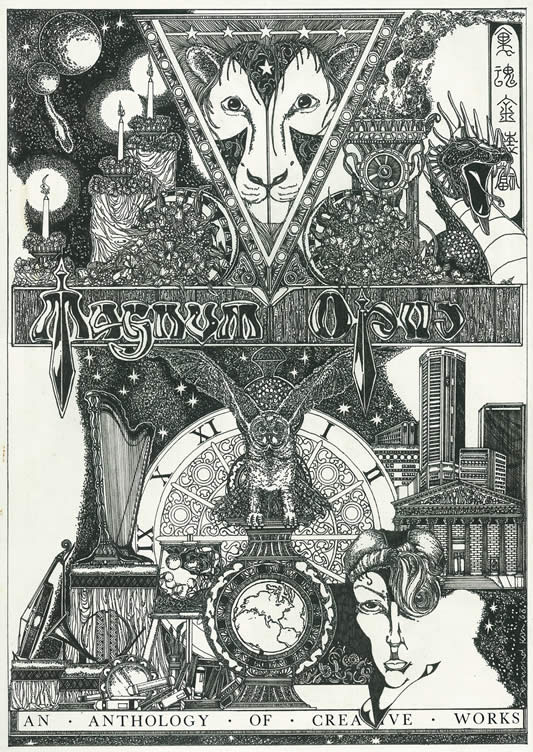UrbanWire presents the mastery of Desmond Kon’s literary works together with an interesting email interview that reveals the poet’s influences and his opinion on the literary scene in the US and Singapore. An audio recording, poems and a track from the audio book, How to Read a Poem, all for your reading and listening pleasure.

Audio recording of Desmond reading “love song of empress wu”
love song of empress wu
{the buds} {redden pink} {these titular tips} {plums}{I upward hurl}
{eunuch these} {chinoiserie scholars} {deerweed roots}{never}
{rot into life} {I smelt emeralds} {leaves} {they don’t money}
{leave me} {lift me}{lift greenback life beyond}{themselves overdue seasons}
{when was I here} {the last time onstage} {whenever was he bereft}
{all think my pickling thoughts} {love} {needs}{nouveau needs}
{a love song} {that many} {that wildfires} {propertied face}
{flicker ash} {he’s shivering} {these high seas self-made} {my lilies call}
{on me} {two by two} {we surface congress} {up on} {my terms}
{minarets}{they scar skies} {tall} {as heel spike hands} {needled}
{as him} {I don’t mind} {being unbound}{buckled nature} {or any other}
{droll buddha man} {this this trouble} {is just} {just distaste tossed}
{statute coinage to him} {I’m the poorer gold}{striking leggy arms}
{thin twigs} {I’ll pratfall and break} {then bend}{now I fracture primal}
**********
{all this} {because I expect}{stage direct}{precision} {he has petty wagers}
{like me} {but like me} {raped beliefs} {trust wrested} {in the new}
{uptown things like long tears} {girlish and bony} {small hopes changed}
{I sink}{feet first} {my pavilion is wardrobed} {I’m a rose} {rosewood}
{I close in} {I like}{cruel sugarcane doors} {I see}{he lies outside timbre}
{inside in slivers} {peony light breaking} {all over arches}{camber limbs}
{maybe} {you know} {what} {what chic} {I’ve already become}
{maybe you’ll watch} {help me}{I scissor this} {thick chintz}
{silk} {deadened counterfeit worming}{my dress down}{horsehair hoops}
{and I fall} {crinoline seasons fall}{heavy} {obedient} {pomegranate}{pools}
{they too pick my dresses} {chanteuse envy} {you’re duty bristle trouble}
{like me} {or else} {I’ll slash} {hand cream thighs} {bride red}
{do you see} {my blood swath} {your slight blood} {lilies water roses}
{like my lilies} {like me arranged} {my lilies}{like Victoria’s Secret lace}
* Wu Zetian remains the only woman in Chinese history to rule as an emperor. Sometimes excessively criticized for her autocratic rule, Empress Wu ruled between 690-705 AD during the Tang Dynasty. These two sonnets, reflecting off each other, recast and expand the first English translation of the poem by Kenneth Rexroth and Ling Chung, written as an octave. This poem first appeared in The Pinch.
pitcairn hierarchy
imagine its platinum secrets
stripped and searched, flypass naked
hung-out fugitives; floppy lugsails
these are short-lived curios, volcanic ash
these are mud men baring silverfish teeth
leery, jumpy dilettante too; wide gambit grins
effigies tumble and snap like clapboards
boom boom target boards, cutting this dead air;
pembroke tables flapping, breaking sheer
imagine no one finding anyone interesting anymore
all bets off, body bags tagged; into oceans, walk
all skinned on big-bilge water, latex, splints
boom boom woodwinds; tequila statuary adrift
this horizontal, white mast spears, fore-and-aft line
but no one’s playing pirate or daring planks:
| our memory games our ducat stage names |
(plotting principalities) pilot our long haul:
| aviate / heavy-freight |
and everyone flees what’s been situated
but what about the through road today dragging
itself thoroughbred affection, through and through
what makes you stay; sylphlike, my fly-fish lining
what of consensus; what of leeward conversions?
visas to the pitcairn islands are easy;
but the missing are inconsolable
but for the missing, inconsolable
* The word “hierarchy” originated from hierarchia (“ranked division of angels”), first coined by the anonymous Pseudo-Dionysius the Areopagite, a 5th Century Christian mystic theologian-philosopher. The term “hierarchy” can also be etymologically traced to ta hiera (“sacred rites”) and archein (“to lead, rule”). Pseudo-Dionysius understood all reality to be hierarchic, believing, as René Roques asserts, that “the totality of this twofold universe, the angelic and the human, constitutes a sacred order, an understanding, and an activity, all regulated by the law of hierarchical mediations, both in the sense of the ‘descent’ of divine illumination and in that of the ‘ascent’ of divinization”. The third choir of the second hierarchy of angels, Principalities remain the guardian angels of the world’s territories. They manifest as rays of light. This poem first appeared in Faultline.
Bulletin D

* This poem first appeared in Seneca Review.
The Trapeze Artist
From the audio book: How to Read a Poem
Inspired Poem by: Peng-Ean Khoo
Pipa by: Samuel Wong Shengmiao
Audio track: “The Trapeze Artist”
“The Trapeze Artist” is a track from How to Read a Poem, first published in 2003.The recording features Samuel Wong Shengmiao on the pipa mimicking the theatrics of Peng-Ean Khoo’s “The Trapeze Artist”. The album was created as an audio book for the creative anthology, Dead People, Flying Fishes And The Ones Who Missed Boat, for which Desmond Kon was the editor.
This illustration is reprinted here. It first appeared 20 years ago as a centrefold in My Word, a junior college literary magazine on which Desmond contributed his artwork.

